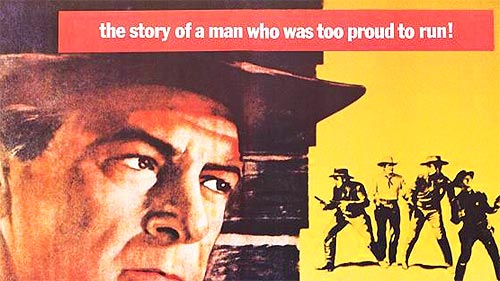June 7, 2004
| Oh, Those Crazy Blogs >>
Showdown

Maureen Dowd writes about Bill Clinton, George W. Bush, and “High Noon” today:
[Clinton] said his editor, Bob Gottlieb, had left his Yeats references but cut his movie odes: “I wanted to write a whole page about ‘High Noon,’ my favorite movie, and why it’s an important movie.”Many leaders see themselves reflected in the plight of Gary Cooper’s Will Kane, the lonely, romantic Western hero, the retiring marshal who stays and fights the murderous Miller gang even though his Quaker bride (Grace Kelly) and all the townsfolk desert him. […]
Let me tell you about “High Noon.” It is one of two essential Westerns: Movies that embody the genre and, as an added bonus, articulate very specific, and very different, theories of life and the world.
“High Noon” says: You can’t count on anyone. In the end, you face your destiny alone. Be resolute.
This philosophy is, of course, not unfamiliar. Dowd:
And the analogy has often been used by people writing and talking about the Bushes’ facing down Saddam. Just as the movie was seen as a classic allegory for the cold war, when the virtuous American sheriff tried to police a paranoid world with enemies lurking everywhere, so it has been cited by some conservatives who like to see it as an allegory of Bush II’s “heroic” unilateralism. In an alienated world, a friendless W. had to do the dirty work to get rid of Saddam all by himself, a lawman who refused to be shoved, ready to die all alone on some dusty street for a tin star. […]
But she ends with this:
There was one powerful man who thought the film was the most un-American he’d ever seen: John Wayne. The Duke couldn’t bear to see a hero begging for help.
I wonder if that’s really the reason John Wayne didn’t like “High Noon.”
You see, John Wayne starred in the other essential Western — a movie that articulates a very different theory of the universe.
That movie is “Rio Bravo.”
In “Rio Bravo,” John Wayne plays Sheriff John Chance. It’s another tick-tock plot: This time, a gang of thugs is coming to break a murderer out of jail.
But in “Rio Bravo,” John Wayne doesn’t want any help; he shoos everybody away — even though they all want to stay — because he thinks they’ll just get in the way. Because he thinks they’re too weak.
But in the end, even John Chance can’t beat the bad guys alone. Luckily, his rag-tag friends — the aging deputy, the drunk, the dancer, the trail boss — are with him whether he likes it or not, and they all have a role to play.
“Rio Bravo” says: No man is an island. You’re never really alone. Help is on its way.
So which is more your speed — the fatalism (or is it just realism?) of “High Noon” or the multilateralism (or is it just faith?) of “Rio Bravo”?



Comments
Somewhere, if there is any justice, David Bailey is reading this blog, and weeping tears of joy, whispering to himself, "At least something from that class stuck."
:)
Bailey, of course, came down 100% on the side of Rio Bravo. I think he called High Noon "fascist" one time.
And it's probably not too hard to tell that I am also of the Duke's party.